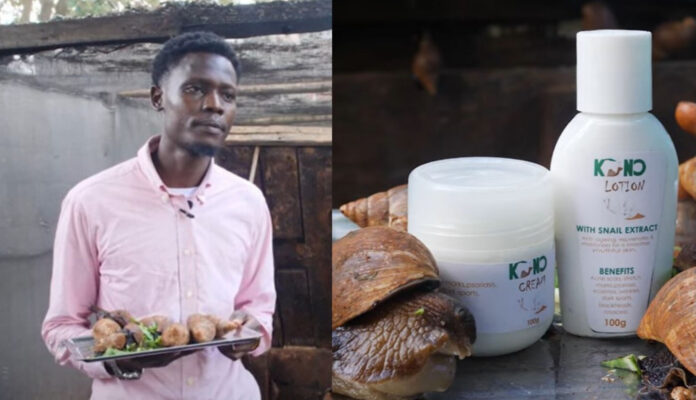Snail Meat (Escargot) is considered a delicacy in many parts of the world, including Kenya. Salt, lemons and anything with acidic content is the last thing that young farmer Ephraim Okeyo would want to see at his Snail Farm in Nairobi.
He is the founder of Kono Farm enterprise, specializing in heliculture, or snail farming. Ephraim first came across Snail farming when he toured a snail farm in Nairobi. There he got the motivation to start snail farming commercially.
Immediately, Ephraim immersed himself in extensive reading, and research, and sought out training. His efforts bore fruit when he launched his enterprise, which has been successful since inception three years ago in January 2021.
He majors in snail farming as a solution to food security and malnutrition. For him, snail farming is a full-time job adding that it has proven to be extremely financially sustainable.
“Currently, 20% of Kenyans are facing malnutrition and lack of protein is the major cause of that. We saw this as an alternative source of protein that we can introduce,” he says.
When he started out, he was unaware of the fact that his snail farm would become a source of income.
However, during his snail farming training, he observed that heliculture farmers were struggling to meet market demand. As his snail farm expanded, he began to see profits rolling in.
In addition to selling snail meat (Escargot), Ephraim’s Kono Farm produces a range of other products, including body and face creams, lotions, and beauty soaps.
He also plans to introduce a line of face masks and serums in the future. These products are made from a blend of avocado oil, castor oil, and snail slime.
“It has anti-ageing properties and it moisturizes and repairs the skin. It really has a lot of benefits. We usually sell; 100g goes for Sh. 300, 250g goes for Sh. 650 and 350g goes for Sh. 800,” Ephraim explained, adding that the beauty soaps cost Sh. 800 per piece and they make special formulations according to customer preference.
Ephraim stated that most of his clients are expatriates from Asia and West Africa. He also supplies snail meat to high-end restaurants in Upper Hill and Westlands. Interestingly, he shared that some Kenyans request snails from the farm for their consumption.
How I make Ksh 200,000 per month from Snail farming
“The snails, the snail meat (escargot) and the slime are on demand. We mainly sell the snails for consumption…we sell the live snails at Sh. 2,500 per kg, snail meat at a minimum of Sh. 3,000 per kg and snail slime sells at Sh. 1,300 per litre,” he said.
He noted that snail farming in Kenya doesn’t require lots of space. On average, it takes 6 to 7 months for snails to reach harvesting. However, one can harvest earlier provided that an individual snail weighs 140g at harvest.
“The snail can eat up to 5 different types of plants. Be it the sukumawiki, cabbages, lettuces, potatoes and fruits except the acidic ones like lemons, oranges and pineapples.”
“The demand is there and even currently we aren’t meeting the demand. That’s why we are encouraging other people to venture into such kind of practice…the demand is too high and we can’t meet it,” he said.
Furthermore, Ephraim elaborated on the advantages of snail farming compared to poultry or other types of farming. He stated that it is not financially demanding, requires minimal space for setup, and has readily available feeds compared to other agricultural practices.
“A kg of snail goes at Sh. 2,500. In producing a kg we’ll use around Sh. 500 for feed transport and labour,” Ephraim expounded on the minimal inputs and high margins of the practice.








